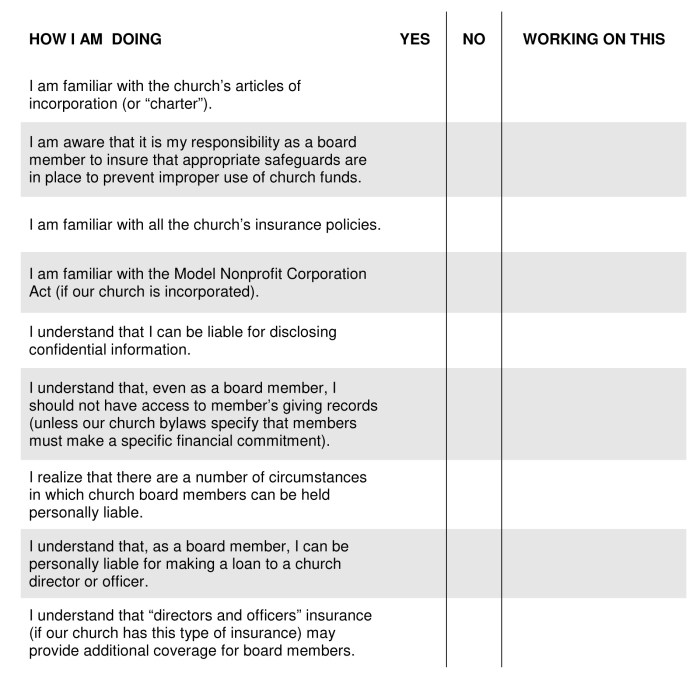Your role as a church board member is incredibly important for the church. There are also liabilities and responsibilities that you should know about that come with this role. Use this assessment to determine how prepared you are to serve in this way.

Stay Informed to Prevent Church Lawsuits
Years ago church leaders didn’t have to worry about litigation. Churches simply were not likely to be sued. Times have changed. With today’s churches facing huge verdicts on high-profile lawsuits, board members cannot afford to be uninformed about the legal liabilities facing the church. Consider these litigation trends among churches:
Lawsuits involving churches cover almost every area of church life. The most common lawsuits stem from personal injury cases. Other common areas include employee disputes, membership disputes, employment problems with clergy, lawsuits over title to property, litigation with zoning boards, tax and IRS disputes, and violations of securities law. In recent years, church board members have also been named as defendants in cases. For example, church board members have been called on in cases relating to the negligent selection of church workers who later molested a child.
Lawsuits involving children require particular attention. Past studies have shown that nearly 1 church in 100 reported responding to an allegation of child molestation in a church-sponsored program. Research indicates that when child molestation occurs, 10 to 20 percent of the time, there are multiple victims. Churches are at great risk of a lawsuit when an allegation of child sexual abuse is made.
Embezzlement is on the rise. Past studies have shown that as many as 15 percent of churches reported having had problems with theft among volunteers and paid staff members. This percentage is rapidly increasing.
Unfortunately, in many churches nothing is being done to reduce these major legal liabilities. Research has shown that:
- Approximately 75 percent of churches do nothing to assess liability risks.
- Most churches use no formal employment application and less than one-fourth screen staff members who work with children.
- Almost 90 percent of churches surveyed had no sexual harassment policy.
- Less than 1 in 3 churches had an employee handbook, and of those that did, only 10 percent had been reviewed by an attorney. The vast majority of church leaders don’t even know of an attorney that can help them with respect to the unique legal needs of churches.
As a board member, make it your mission to stay informed. Your vigilance will become your church’s greatest protection from legal entanglements.
Download a PDF version of this checklist.





